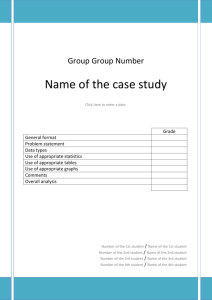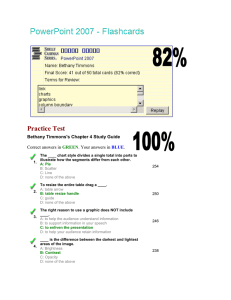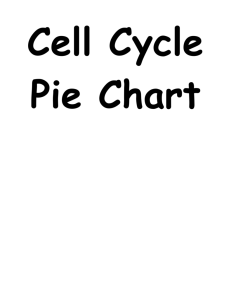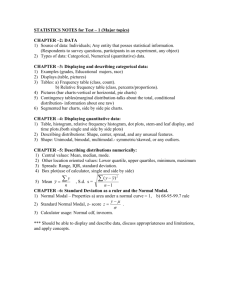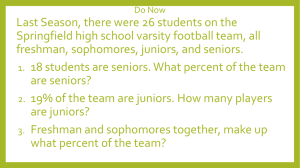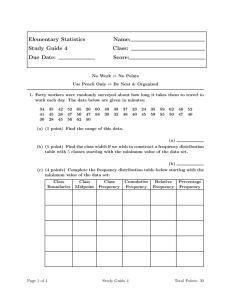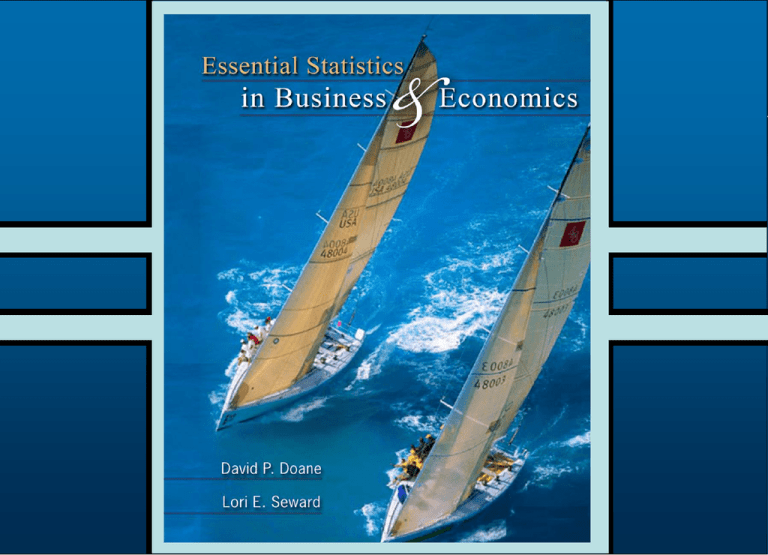
3B-1
Chapter
3B
Describing Data Visually (Part 2)
Scatter Plots
Tables
Pie Charts
Effective Excel Charts
Maps and Pictograms
Deceptive Graphs
McGraw-Hill/Irwin
© 2008 The McGraw-Hill Companies, Inc. All rights reserved.
3B-3
Scatter Plots
• A scatter plot shows n pairs of observations as
dots (or some other symbol) on an XY graph.
• A starting point for bivariate data analysis.
• Allows observations about the relationship
between two variables.
• Answers the question: Is there an association
between the two variables and if so, what kind of
association?
3B-4
Scatter Plots
Example: Birth Rates and Life Expectancy
• Consider
the
following
data:
Nation
Birth Rate
Life Expectancy
Afghanistan
41.03
46.60
Canada
11.09
79.70
Finland
10.60
77.80
Guatemala
34.17
66.90
Japan
10.03
80.90
Mexico
22.36
72.00
Pakistan
30.40
62.70
Spain
9.29
79.10
United States
14.10
77.40
3B-5
Scatter Plots
Example: Birth Rates and Life Expectancy
• Here is a scatter plot with life expectancy on the
X-axis and birth rates on the Y-axis.
• Is there an
association
between the two
variables?
• Is there a causeand-effect
relationship?
3B-6
Scatter Plots
Example: Aircraft Fuel Consumption
• Consider five observations on flight time and fuel
consumption for a twin-engine Piper Cheyenne
aircraft.
• A causal relationship
is assumed since a
longer flight would
consume more fuel.
Trip Leg
Flight Time
(hours)
Fuel Used
(pounds)
1
2.3
145
2
4.2
258
3
3.6
219
4
4.7
276
5
4.9
283
3B-7
Scatter Plots
Example: Aircraft Fuel Consumption
• Here is the scatter plot with flight time on the
X-axis and fuel use on the Y-axis.
• Is there an
association
between
variables?
3B-8
Scatter Plots
Degree of Association
Very strong association
Strong association
Moderate association
Little or no association
3B-9
Scatter Plots
Policy Making
• Scatter plots can be helpful when policy decisions
need to be made.
• For example, compare traffic fatalities resulting
from crashes per million vehicles sold between
1995 and 1999.
• Do SUV’s create a greater risk to the drivers of
both cars?
3B-10
3B-11
Tables
• Tables are the simplest form of data display.
• A compound table is a table that contains time
series data down the columns and variables
across the rows.
Example: School Expenditures
• Arrangement of data is in rows and columns to
enhance meaning.
• The data can be viewed by focusing on the time
pattern (down the columns) or by comparing the
variables (across the rows).
3B-12
Tables
Example: School Expenditures
Elementary and Secondary
Year
All
Schools
Colleges and Universities
Total
Public
Private
Total
Public
Private
1960
142.2
99.6
93.0
6.6
42.6
23.3
19.3
1970
317.3
200.2
188.6
11.6
117.2
75.2
41.9
1980
373.6
232.7
216.4
16.2
140.9
93.4
47.4
1990
526.1
318.5
293.4
25.1
207.6
132.9
74.7
2000
691.9
418.2
387.8
30.3
273.8
168.8
105.0
Source: U.S. Census Bureau, Statistical Abstract of the United States: 2002, p. 133.
Note: All figures are in billions of constant 2000/2001 dollars.
• Units of measure are stated in the footnote.
• Note merged headings to group columns.
3B-13
Pie Charts
An Oft-Abused Chart
• A pie chart can only convey a general idea of the
data.
• Pie charts should be used to portray data which
sum to a total (e.g., percent market shares).
• A pie chart should only have a few (i.e., 2 or 3)
slices.
• Each slice should be labeled with data values or
percents.
3B-14
Pie Charts
An Oft-Abused Chart
• Consider the following charts used to illustrate an
article from the Wall Street Journal.
Which type is better?
2-D Pie Chart
Bar Chart
3B-15
Pie Charts
Pie Chart Options
• Exploded and 3-D pie charts add strong visual
impact but slices are hard to assess.
Exploded Pie Chart
Exploded 3-D Pie Chart
3B-16
Pie Charts
Common Errors in Pie Chart Usage
• Pie charts can only convey a general idea of the
data values.
• Pie charts are ineffective when they have too many
slices.
• Pie chart data must represent parts of a whole
(e.g., percent market share).
3B-17
Deceptive Graphs
Error 1: Nonzero Origin
• A nonzero origin will exaggerate the trend.
Deceptive
Correct

